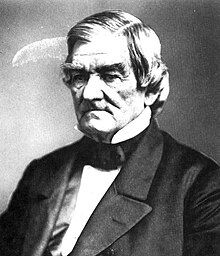John Ross (chief)
John Ross (born October 3, 1790 in Turkeytown , Alabama , † August 1, 1866 in Washington, DC ), who also went by his Cherokee name ᎫᏫᏍᎫᏫ Guwisguwi (a mythological bird of the Cherokee; Cherokee transliteration : Koo-wi-s- gu-wi ) was from 1828 to 1860 Supreme Chief of the Cherokee Indian people in the southeast and western United States of America . He led the nation of the Cherokee during the Indian Removal and reconstruction of the nation in Indian Territory in what is now the state of Oklahoma on.
Life
Ross was born on October 3 in Turkeytown on the Coosa River , Alabama, to the Scottish- Indian Mollie McDonald and the immigrant trader Daniel Ross from Scotland. Thanks to his bilingual upbringing, Ross was appointed Indian agent in Arkansas at the age of 20 . During the British-American War he fought in the Battle of Horseshoe Bend against the Muskogee, allied with the British .
Ross turned out to be a gifted businessman. He founded the Ross’s Landing ferry station , which later became the city of Chattanooga , and managed a plantation near New Echota with the help of slaves . He is considered one of the five richest Cherokee of his time.
His home in the place named after him in Rossville in Walker County , Georgia , the John Ross House , was declared a National Historic Landmark of the United States in 1973 .
After initial political experience, Ross was elected to the board of the Cherokee Council in 1818. He showed great skill in negotiating with the United States, which was trying to pressure the Cherokee into giving up their tribal lands. After the death of Pathkiller , the chief chieftain of the Cherokee, Ross was elected in his place. A staunch opponent of the Cherokee eviction and resettlement, he tried to legally force the United States government to recognize the sovereignty of his people. His political opponent Major Ridge , leader of the so-called "Treaty Party" ("Contracting Party"), which advocated resettlement, signed the Treaty of New Echota , with which the rights of the Cherokee to their tribal areas in exchange for new areas in Indian territory the United States passed over. Ross tried to prevent the relocation, but after ratifying the treaty and unsuccessful legal attempts to annul the non-majority agreement, the Cherokee were forced to relocate on the path of tears . His wife Quatie was among the victims of the forced eviction. He later married Mary Brian Stapler.
After the great losses of the people, Ross helped rebuild the nation in the west as the Cherokee Nation of Oklahoma. Until 1860 he led the nation as Supreme Chief. During the Civil War , Ross sided with the Confederates in an effort to protect the nation . On October 7, 1861, a treaty was signed that included a friendship treaty and an alliance. But a few months later Ross and his supporters switched sides and fled to Kansas. Union troops invaded Cherokee territory in 1862. Ross traveled to the east coast and tried to repair the strained relations between his people and the Union government. During the war he stayed primarily in Philadelphia . Ross turned to Abraham Lincoln and traveled to Washington DC to strengthen the Cherokee's rights as a sovereign nation and facilitate reconstruction. Meanwhile, fighting raged in Indian territory. Ross opponent of the chief Stand Watie and his supporters fought the troops of the Union on the side of the Confederation. After the Cherokee surrendered in 1865, Ross became chief again.
literature
- Edwards Everett Dale: Cherokee Cavaliers: Forty Years of Cherokee History as Told in the Correspondences of the Ridge-Watie-Boudinot Family . University of Oklahoma Press 1995, ISBN 080612721X .
- Russell David Edmunds: American Indian Leaders: Studies in Diversity . University of Nebraska Press 1980, ISBN 0803267053 .
- Gary E. Moulton: John Ross: Cherokee Chief. Georgia University Press, Athens 1978, ISBN 0-8203-2367-5 .
- Gary Moulton: The Papers of Chief John Ross: 1807-1839, 1840-1866 . University of Oklahoma Press 1985, ISBN 0806118652 .
Web links
- Alice Taylor-Colbert: John Ross (1790-1866) . In: New Georgia Encyclopedia, published November 12, 2004, edited October 31, 2017.
- About North Georgia: John Ross
Remarks
- ↑ Cherokee Nation Web Presence: John Ross ; accessed December 18, 2018.
- ^ National Park Service, Digital Asset 73000647 ; accessed December 18, 2018.
- ^ Gary E. Moulton: John Ross, Cherokee Chief, University of Georgia Press. Page 175
| personal data | |
|---|---|
| SURNAME | Ross, John |
| ALTERNATIVE NAMES | Guwisguwi |
| BRIEF DESCRIPTION | Cherokee chief and politician |
| DATE OF BIRTH | October 3, 1790 |
| PLACE OF BIRTH | Turkeytown , Alabama |
| DATE OF DEATH | August 1, 1866 |
| Place of death | Washington, DC |



